Julie Deane CBE is the founder of The Cambridge Satchel Company, which manufactures all its bags in the UK. I chatted to Julie on Made in UK Day to talk about why the Cambridge Satchels are made in the UK, and how important it is to retain craftsmanship here in Britain.
Back in October 2021 I also had the good fortune to be invited inside the Cambridge Satchel factory. These photos, taken by my daughter Flossie who accompanied me on the trip, show the craftsmanship that goes into making each Cambridge Satchel bag.
Watch the live episode that was recorded on Made in UK Day on our YouTube channel here.
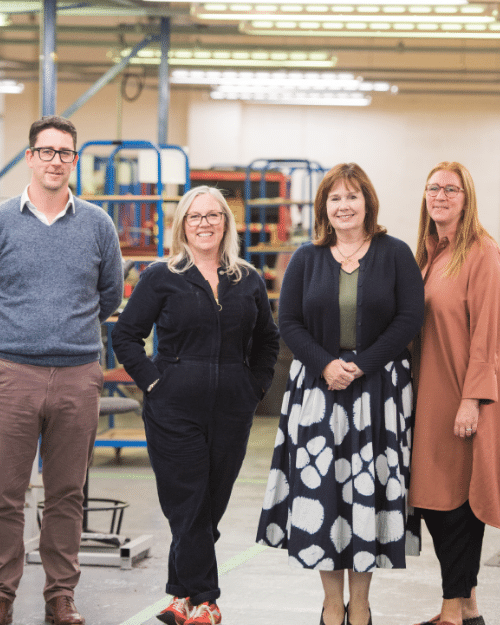
Kate: Julie, thank you so much for joining me today for Made in UK day.
Julie: I’m excited for today. You know, because every time I keep discovering all these new fantastic businesses that are making things in the UK and that is just so brilliant to see. Especially as we’ve had a very, let’s say challenging two years, which keeps being very challenging and you know, every time a new challenge arises I just look at it and think we can’t afford to lose any sector in this country. We’ve got to be able to be strong and to stand independently as much as we can; collaborate with as many people as we can. We have to be self-sufficient and in no sector do I feel more passionately that that’s true than manufacturing. I’m very proud to make everything here in the UK.
Kate: So true, and we just did a survey at Make it British, and we had nearly 1300 people respond to that survey. People were saying: “I want to buy UK-made products. I’m willing to pay more for them, but also I really want to buy them from small businesses, not the large corporate companies.”
So what we want to do today (on Made in UK Day) is raise awareness for all of the small businesses that make in the UK. I know you were recently featured in the government’s Made in UK, Sold to the World campaign weren’t you? It’s brilliant to promote exports, but we kind of need that at home as well don’t we?
Julie: We absolutely do. And the thing is there’s no sort of kitemark equivalent to say this is actually made in the UK, which is madness because people use this goodwill to sort of say, ‘inspired in the UK’ or ‘imagined in the UK’ or ‘designed in the UK’, but where are they making it?
So for those of us that are actually making from scratch, as my mother would say about her cooking, we want some very obvious mark on there so people can make that choice.
“We’ve got to be able to be strong and to stand independently as much as we can; collaborate with as many people as we can.
We have to be self-sufficient and in no sector do I feel more passionately that that’s true than manufacturing. I’m very proud to make everything here in the UK.”
Kate: Yeah, definitely. There’s too much fake it British going on, as I call it. The Union Jack is kind of a good thing and a bad thing. It’s almost in a way our downfall because people think. ‘oh, there’s a Union Jack, it must be British’. You don’t put Union Jacks on any of your bags, do you?
Julie: No, but people who don’t make in the UK do, you know? Why not just have one standard mark that’s regulated so that you can only use it if you’re making in the UK, not if you’re only doing the last 5% in the UK.
There is something so wonderful about manufacturing too. You know from when you came down to our workshops in Syston. To see things being made, there’s a real kind of magic to it. I just love it. Not everybody wants to work on a screen.
Kate: Yeah, that’s so true. Shout out to everyone that works in your factory, because when I went there I was so impressed at the level of craftsmanship. It’s just incredible. I know it’s tough as well. When running a factory, you’ve got a lot of people that you’re responsible for, and they’re all making beautiful things. So a big round of applause for that.
Julie: They’ve been with us for years, and so it’s not just, you know if somebody phones in and says, “so-and-so has tested positive and they won’t be in” it’s not like, well that’s a gap in the manufacturing. You’d just sort of say, “Oh gosh, I wonder if she’s okay? Is she going to be all right?”
You know, they are the people that you get to know. You don’t have that connection with your product if you’re making it in some factory on the other side of the world.
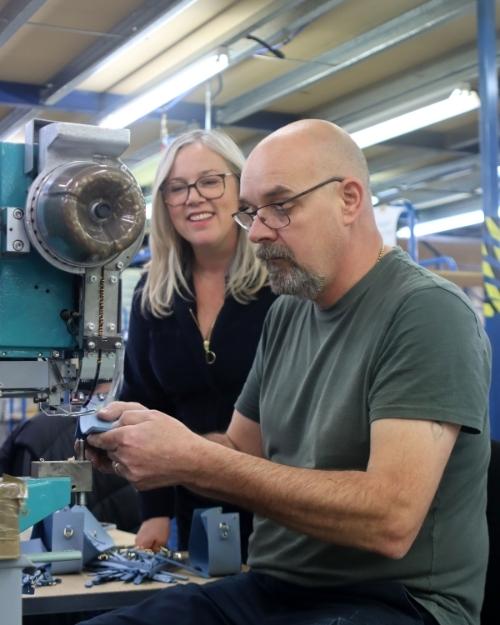
Kate: How do you think we can encourage people to just really discover more about where brands are making their products? What are your thoughts on that?
Julie: When I was in school a long time ago in South Wales, we used to have school trips all the time. We went to Buckley’s Brewery, and we went to Avon Inflatables Life Craft. We would always be out. I think that the school teachers just loved a nice trip. I know that, of course, we need the health and safety things, but isn’t it a shame that the kids don’t seem to be out and about visiting factories, seeing how things are made, and, you know, seeing all the different jobs that they could want to do, all the different crafts that they could want to do, because it’s not just a single pathway.
Kate: Exactly, and that’s also the thing that I think people think, you know, anything that’s product-related, that it’s just about the design, but there’s so much more.
Julie: Oh my gosh, there’s so much more. There are so many parts to making every one of the bags that, you know, I certainly couldn’t do. There are people that have such skills that they can just work wonders, and there is an absolute magic to walking around and seeing those things being made.
Kate: You’re going to get teachers ringing you up saying, “Okay, when can the bus turn up, please?”
Julie: I think Mark, who runs the workshops in Syston, is probably looking at this thinking, “Oh my god, I can’t believe she’s saying this” But it’s so exciting, I would love more people to actually see what manufacturing looks like.
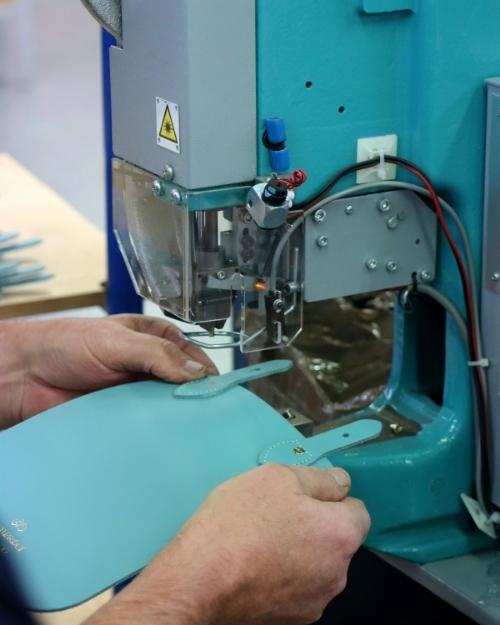
Kate: Yeah, definitely. Well, we’ve got “Inside the Factory”. You’ve not been on that yet, have you?
Julie: No, I haven’t. We should be, we’re so colourful. You know, we’re not like making tiny little techie chips or something, you know.
Kate: They’ve been to Dr Martens recently, but they haven’t been to your place yet, so I think that’s an open invite. Isn’t it Julie?
Julie: I know, they should get in touch with me.
Kate: So, what else is on the cards for Cambridge Satchel at the moment, then?
Julie: So, obviously, sustainability is something that is very important to all of us, even though we seem to have crises all over the place, such as the big ongoing one, climate change. One thing that I think that we don’t do a very good job of is saying that yes, they’re leather bags, but the leather that goes into all our satchels is a by-product of the meat industry, otherwise it would go into landfill. When you’re buying things, it’s so important to just buy something that’s going to last.
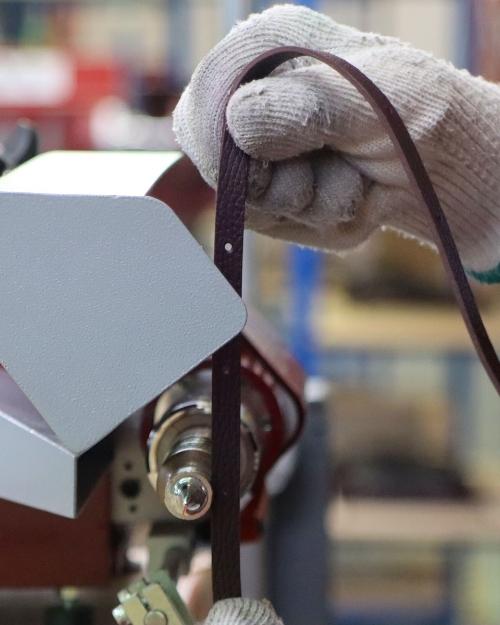
Julie: You know, my 15-inch dark brown satchel is my favourite. You saw it in the International Women’s Day photo that was on our Instagram.
But, no, that bag is 12 years old. You know, I’ve used it as my work bag for 12 years, and it’s really hitting its stride. It’s soft and it looks so full of character. And so buy things that last. That’s an important thing, and when we make the curios, we’re determined not to have waste. We don’t want to be throwing things away.
So, using the key curios and the keyrings, we use every last scrap. So we’re very mindful of that. And also, because you’re buying something that was made in Britain, you don’t have that enormous carbon footprint. Not bringing it over from the other side of the world; it was made right here.
So that’s the carbon side, but then we did make some vegan-friendly bags with Melissa, you know, years ago, but we are on the lookout for a vegan-friendly alternative material. An alternative to leather, but one that, again, doesn’t have an enormous carbon footprint. So one that isn’t coming from a very long way away, because otherwise you’re just ticking a box and you’re saying, oh, look, you can have this if you don’t want leather, but actually, you’re just ticking a box because you’re doing damage by shipping it all over. Anyone who wants to tell me about great vegan alternatives to leather that are made here in the UK, we are totally up for it.
“…the leather that goes into all our satchels is a by-product of the meat industry, otherwise it would go into landfill. When you’re buying things, it’s so important to just buy something that’s going to last.”
Kate: Okay, brilliant. Well, if I find any Julie, that’s a great challenge. We’ve got questions from our viewers. Tweedles Handmade says she was wondering, did you ever consider working with independent machinists or did you always go straight to having the factory?
Julie: Oh my gosh.
Kate: This is a whole saga in itself, isn’t it?
Julie: In the beginning, we were working with a lovely independent workshop in Hull, but Allie could only make about 200 bags a week. So then we took on Ewan from Pringle of Scotland. If you look them up, they do leather goods in Scotland, and he makes amazing things, and he manufactured for us. And then I had slightly crazy Clive in Norfolk join the gang. And so we had all of these independent manufacturers. The thing is, as you scale, it’s quite hard to get consistency. They might be using slightly different rivets or, you know, that consistency is quite hard to achieve.
Then we hit a very poor manufacturer that ripped off all our designs. And it was at that point that I thought, you know what, we’ve got to start making ourselves and try and get some control, which has been a great thing. But yes, we love using independents.
Kate: Brilliant, and if anyone wants to hear the full story, you did a podcast episode with me, didn’t you, a year or two ago? I will share the link later on so everyone can revisit the whole sorry saga. (Click here to listen to episode 142)
Julie: I know, get a cup of tea and a box of tissues ready, sit down, and listen.
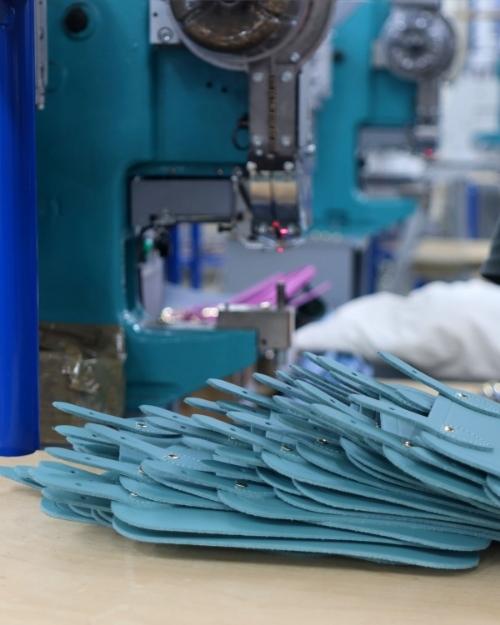
Kate: Everyone’s giving you tonnes of love for all of your suggestions about a kitemark and for the amazing stuff that you do at Cambridge Satchel.
Julie: It’s about communicating, you know, and getting it out there, because if people don’t know, how can they make an informed choice?
Kate: Yes, exactly. I would also like to give a little shout out to your newsletter, Julie, the Cambridge Satchel newsletter, because it’s great and that’s where people hear about things that you do first, isn’t it?
Julie: We also have a really fun quiz on the website that Liv and the team here at Cambridge Satchel devised. It was one of these things. We make so many bags, how do people find the right bag for them? So it is kind of like a matchmaker for bags. So you can go on there and you can work through these really random questions and at the end, it’ll say, “This is the bag for you; this is the bag we think would suit you.”
Kate: That’s such a good idea, but it also ties in with the whole ethos of Cambridge Satchel, where everything’s a bit quirky. We’ve got one last question for you. Sue’s lake designs, she said, “What advice would you give to small businesses to get their name out there when you’re first starting out?”
Julie: Oh, that’s a great question. I think the number one thing that I would do is get clear in your mind about what it is that you do, that you feel you do brilliantly, and then what are you doing it for? So for me, it was to send my two kids to a really great school. So once you have that really clear in your mind, it makes you strong because you know what success looks like to you.
But as you grow, you don’t want to keep moving the goalposts. You want to feel like this is why I did it, and I’m doing it every day. So that’s a good thing to do. And then, once you’ve decided what you’re doing and what makes you stand out, go to your local library or the business and IP centre, have a chat with them, and see if there’s anything that you could protect because your idea is what makes you strong; that’s your business.
So see what protection you can get. It’s a free service, and they will also tell you things about manufacturer agreements so that you can make sure that you don’t get hooked up with somebody who’s going to do something awful. There are also nondisclosure agreements so somebody doesn’t run off with the idea that you’ve just shared with them. So that’s my advice.
Kate: That’s really good. I think the same. I’ve done the same with Make it British right from the start. My story has always been that I was disillusioned by working for the big corporate companies that were sourcing everything overseas and I wanted to go back to supporting the companies that made here in the UK to save, you know, essential skills, just like you’re doing Julie, and making sure people are still making things in this country, because can you imagine if we lost it all?
“…the number one thing that I would do is get clear in your mind about what it is that you do, that you feel you do brilliantly, and then what are you doing it for?
So for me, it was to send my two kids to a really great school. Once you have that really clear in your mind, it makes you strong because you know what success looks like to you.”
Julie: I can imagine because when we needed to buy one of our large cutting presses to set up, we had to import it from Poland. And when it got back, where was it made? Sheffield, madness. That’s what happens when you close down all your factories.
Kate: Yeah, that’s the same with the knitting machines, so much of the machinery, you’re right.
Julie: Yeah, So yes, make it and keep making it here.
Kate: Brilliant. That’s a great phrase to end on. Julie, thank you so much for joining me today.
Julie: No, my pleasure.
